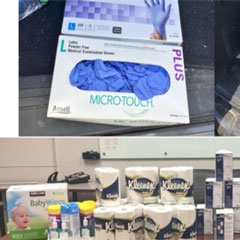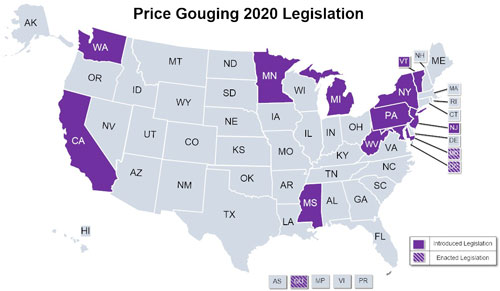By Heather Morton
Hand sanitizer selling for $40, toilet paper for $80. Stories like these have turned public attention to the practice of price gouging during the coronavirus outbreak. And state lawmakers are acting.
 In economics, generally speaking, when demand is high and supplies of a product or labor are low, the price will rise to reflect that demand.
In economics, generally speaking, when demand is high and supplies of a product or labor are low, the price will rise to reflect that demand.
In a state of emergency, the prices of necessary items have the potential to increase very quickly. As a result, state policymakers have put protections in place to cap those prices. With grocery stores struggling to keep up with consumer demand for toilet paper, cleaning supplies, eggs and other products, policymakers moved swiftly to make emergency declarations that triggered protections for consumers to prevent escalating prices on necessary items.
Price gouging refers to when retailers and others take advantage of spikes in demand by charging exorbitant prices for necessities, often after a natural disaster or other state of emergency.
Thirty-four states, Guam, Puerto Rico, the U.S. Virgin Islands and the District of Columbia have statutes or regulations that define price gouging during a time of disaster or emergency. In most states, price gouging is set as a violation of unfair or deceptive trade practices law. Most of these laws provide for civil penalties, as enforced by the state attorney general, while some state laws also enforce criminal penalties for price gouging violations.
Eleven states, Guam and the District of Columbia have introduced legislation in the 2020 legislative session to create or expand price gouging protections. Maryland, Guam and the District of Columbia enacted legislation.
In companion House and Senate bills, Maryland prohibited a retailer from increasing the sale or rental price of any good or service to a price that increases the retailer’s value of profit by more than 10%, including for the price of food, fuel, water and ice, medicine, medical supplies and equipment, cleaning products, building supplies and equipment, energy sources and storage space, and publish a list of goods and services to which this item applies.
The District of Columbia provided that it is unlawful for any person to charge more than the normal average retail price for any merchandise or service sold during a public health emergency. Guam enacted legislation preventing price gouging during a state of emergency or epidemic in addition to natural disasters.
The West Virginia Legislature sent a bill to the governor that, if signed, will amend the definition of “state of emergency” and authorize the governor to periodically review the scope and the time period for which prices for certain goods may not be changed following a state of emergency.

Heather Morton is a program principal in Fiscal Affairs. She covers consumer and financial services issues for NCSL.
Email Heather